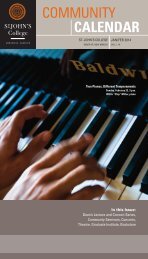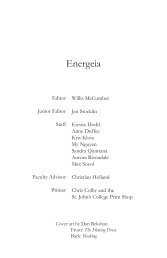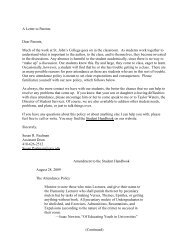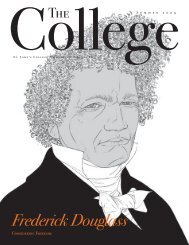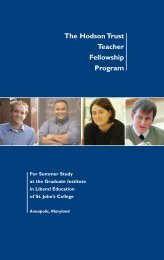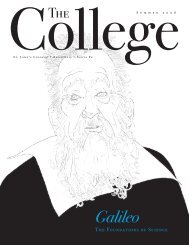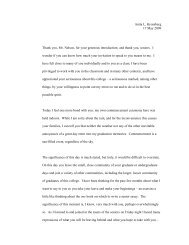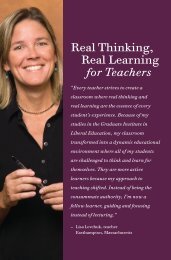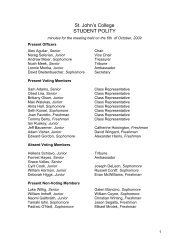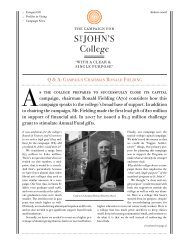âTo Meet with Macbeth,â given by tutor Louis ... - St. John's College
âTo Meet with Macbeth,â given by tutor Louis ... - St. John's College
âTo Meet with Macbeth,â given by tutor Louis ... - St. John's College
You also want an ePaper? Increase the reach of your titles
YUMPU automatically turns print PDFs into web optimized ePapers that Google loves.
Sisters had foreseen a meeting <strong>with</strong> <strong>Macbeth</strong> only. Banquo is present as <strong>Macbeth</strong>’s double: he is the<br />
future that never leaves the present time alone, the “not yet” principle of human action that will<br />
torment <strong>Macbeth</strong> and be assailed <strong>by</strong> him.<br />
Let us listen further to the meeting on the heath:<br />
<strong>Macbeth</strong>.<br />
Speak if you can. What are you?<br />
1. All hail, <strong>Macbeth</strong>! Hail to thee, Thane of Glamis!<br />
2. All hail, <strong>Macbeth</strong>! Hail to thee, Thane of Cawdor!<br />
3. All hail, <strong>Macbeth</strong>, that shalt be king hereafter!<br />
(I.iii.47-50)<br />
The three “alls” and the five “hails” unite past, present, and future time through the named honors<br />
(Glamis, Cawdor, king) of those times. Thus kingship means not only ultimacy of title, but the merging<br />
of past and future into present time—if that missing sixth “hail” (the perfect number of “hails”) can be<br />
supplied. (Lady <strong>Macbeth</strong> will supply it shortly.) Banquo, like a younger sibling demanding “me-too,”<br />
gets the Sisters to speak to him, though they appear reluctant:<br />
1. Hail!<br />
2. Hail!<br />
3. Hail!<br />
1. Lesser than <strong>Macbeth</strong> and greater.<br />
2. Not so happy, yet much happier.<br />
3. Thou shalt get kings, though thou be none.<br />
So all hail, <strong>Macbeth</strong> and Banquo!<br />
1. Banquo and <strong>Macbeth</strong>, all hail!<br />
(I.iii.62-69)<br />
The triple “hails” and prophecies to Banquo accentuate the fair and foul that <strong>Macbeth</strong> sees mixed.<br />
Perfection of knowledge requires more speaking, and perfection of <strong>Macbeth</strong>’s being (as King) first<br />
requires non-being on the part of Cawdor:<br />
<strong>Macbeth</strong>.<br />
<strong>St</strong>ay, you imperfect speakers. Tell me more.<br />
By Sinel’s death I know I am Thane of Glamis.<br />
But how of Cawdor? The Thane of Cawdor lives,<br />
9



